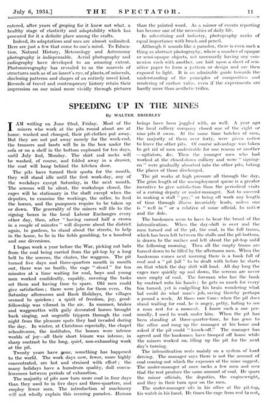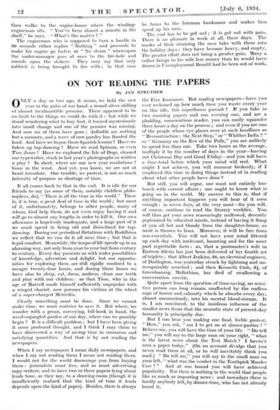SPEEDING UP IN THE MINES
By WALTER BRIERLEY
IAM writing on June 22nd, Friday. Most of the miners who work at the pits round about are at home, washed and changed, their pit-clothes put away. But they are not put away merely for the week-end, the trousers and boots will lie in the box under the sofa or on a shelf in the bottom cupboard for ten days, until July 2nd, Monday. The shirt and socks will be washed, of course, and folded away in a drawer, the coat will hang behind the kitchen door.
The pits have turned their quota for the month, they will stand idle until the first work-day, any of the weekdays except Saturday, in the next month. The screens will be silent, the workshops closed, the cages will be stationary in the shaft except when the deputies, to examine the workings, the ostler, to feed the horses, and the pumpmen require to be taken up or down. The generality of the miners will file to the signing boxes in the local Labour Exchanges every other day, then, after " having earned half a crown in a couple of minutes " will disperse about the district again, to gardens, to stand about the streets, to help in the home, to lie in the fields gambling, to a hundred and one diversions.
I began work a year before the War, picking out bats from the coal being carried from the pit-top by a long belt to the screens, the chutes, the waggons. The pit turned five days and three-quarters month in month out, there was no bustle, the cage " stood " for ten minutes at a time waiting for coal, boys and young men worked confidently, capably, covering the tasks set them and having time to spare. Old men could give satisfaction ; there were jobs for them even. On Saturday afternoons and Bank Holidays, the villages seemed to quicken ; a spirit of freedom, joy, good- fellowship was vibrant in the air. In summer, brakes and waggonettes with gaily decorated horses brought back singing, not ungentle trippers through the cool night from the pleasure spots they had invaded during the day. In winter, at Christmas especially, the chapel schoolrooms, the institutes, the homes were intense worlds of joy—all their short leisure was intense, in sharp contrast to the long, quiet, non-exhausting work at the pit.
Twenty years have gone, something has happened to the world. The work days now, fewer, more highly concentrated, are hot and strained with effort ; the many holidays have a humdrum quality, dull conva- lescences between periods of exhaustion.
The majority of pits now turn more coal in four days than they used to in five days and three-quarters, and employ fewer men. The introduction of machinery will not wholly explain this seeming paradox. Human beings have been juggled with, as well. A year ago the local colliery company closed one of the eight or nine pits it owns. At the same time batches of nien, the majority of them over forty, were given notice to leave the other pits. Of course advantage was taken to get rid of men undesirable for one reason or another —agitators, &c. Then the younger men who had worked at the closed-down colliery and were " signing- on " were gradually absorbed into the other pits, taking the places of those discharged.
The pit works at high pressure all through the day. The grim length of the unemployment queue is a greater incentive to give satisfaction than the periodical visits of a cursing deputy or under-manager. Not to succeed in making a stall " pay," or being off work any length of time through illness invariably leads, unless one is " well in " or a relative of some official, to noti?e and the dole.
The banksmen seem to have to bear the brunt of the intensification. When the day-shift is over and the men turned out of the pit, the coal, in the full trains, which has been left between the stalls and the pit-bottom, is drawn to the surface and left about the pit-top until the following morning. Then all the empty trains arc turned down to be filled by the afternoon men. When the banksman comes next morning there is a bank full of coal and a " pit full " to be dealt with before he starts on that which the day shift will load. All day long the cages race quickly up and down, the screens are never once empty of coal. The foreman who has the bank by contract rubs his hands ; he gets so much for every ton turned, yet is cudgelling his brain wondering what lad could do what man's job, saving thereby perhaps a pound a week. At those rare time> when the pit does stand waiting for coal, he is angry, petty, hating to see a man rest for a moment. I know such a one per- sonally, I used to work under him. When the pit has been standing at three-quarter-time, he has gone to the office and rung up the manager at his home and asked if the pit could " knock-off." The manager has agreed and the banksmen have trooped off home while the miners worked on, filling up the pit for the next day's turning.
The intensification rests mainly on a system of hard driving. The manager says there is not the amount of coal coming out which the expenses of the mine suggest. The under-manager at once sacks a few men and sees that the rest produce the same amount of coal. He spurs the minor officials, the deputies, the enginewright, and they in their turn spur on the men.
The under-manager sits in his office at the pit-top, his watch in his hand. He times the cage from rest to rest, then walks to the engine-house where the winding- engineman sits. " You've been almost a minute in the shaft," he says. " What's the matter ? "
The engineman who is supposed to turn a bantle in 30 seconds either replies " Nothing " and proceeds to make his engine go faster, or " No steam " whereupon the under-manager goes at once to the fire-hole and rounds upon the stokers. They may say that only rubbish is being brought to fire with ; in that case he turns to the foreman banksman and makes him speed up his men. The coal has to be got out ; it is got out with pain. There is no pleasure in work at all, these days. The marks of their straining the men take with them into the holiday days ; they have become heavy, and empty. The greater effort does not bring a greater gain. Many a collier brings to his wife less money than he would have drawn in Unemployment Benefit had he been out of work.











































 Previous page
Previous page